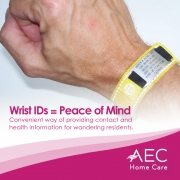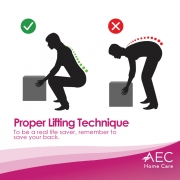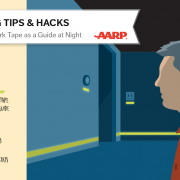Caregiver Tip Tuesday.. Wrist IDs = Peace of Mind
Perhaps you’re a #caregiver or a family member that has a loved one that has special needs, perhaps they have a bad peanut butter or shellfish #allergy that puts them in the hospital, your resident is #diabetic, or your resident has been diagnosed with mild cognitive impairment and has wandered off once before. Maybe you had recently seen the #silveralert on your phone where that one resident was in missing or in danger? Nobody really wants to go through that and go calling all your friends and the police to help you look for your Brother, Sister, Dad, Mother, Aunt or Uncle all over town. There was a rumor about a man from another facility, quite some time ago who had hopped in a cab and was found at an airport bar. I mean, good for that guy, living his best life, but the city and county were on high alert unnecessarily. In no sense of the word can you ever keep a resident locked down against their will, and for residents that do have a tendency to wander often they are assigned a caregiver escort to look out for them and redirect them, but even then it’s not enough. Sometimes your escort will look down at their watch and look up to find their resident has Irish exited like a ninja and they are nowhere to be found. So what can you do to have a back up plan?
Resident Wrist IDs are generally handy for people who have special requests and needs. And a lot of them are washable or have elements that can be attached to watches or look like nice pieces of jewelry. In the past, a lot of these ids were specifically for people with heart conditions or diabetic needs for paramedics to read.. in recent years, however, they’ve been made to include any sort of information you’d like, such as responsible party, address, their doctor, and of course health concerns such as life threatening allergies. This is good for the caregiver and the caregiver’s family.
For example, you as a caregiver are escorting Mrs. S. and making sure they don’t grab a peanut laden candy bar when it says on their wrist they are diabetic, are allergic to nuts and have MCI. This serves as a reminder for you as a caregiver when you see their wristband and the candy bar, and to remind the next caregiver coming on shift who hasn’t worked with Mrs. S. before that they have special medical needs. The oncoming caregiver to look out for Mrs. S should know this already.. but the wrist band provides an extra level of communication that sometimes is needed as a safety net for when miscommunication happens. For this reason, wrist band IDs are a great help to caregivers and families alike for peace of mind.








